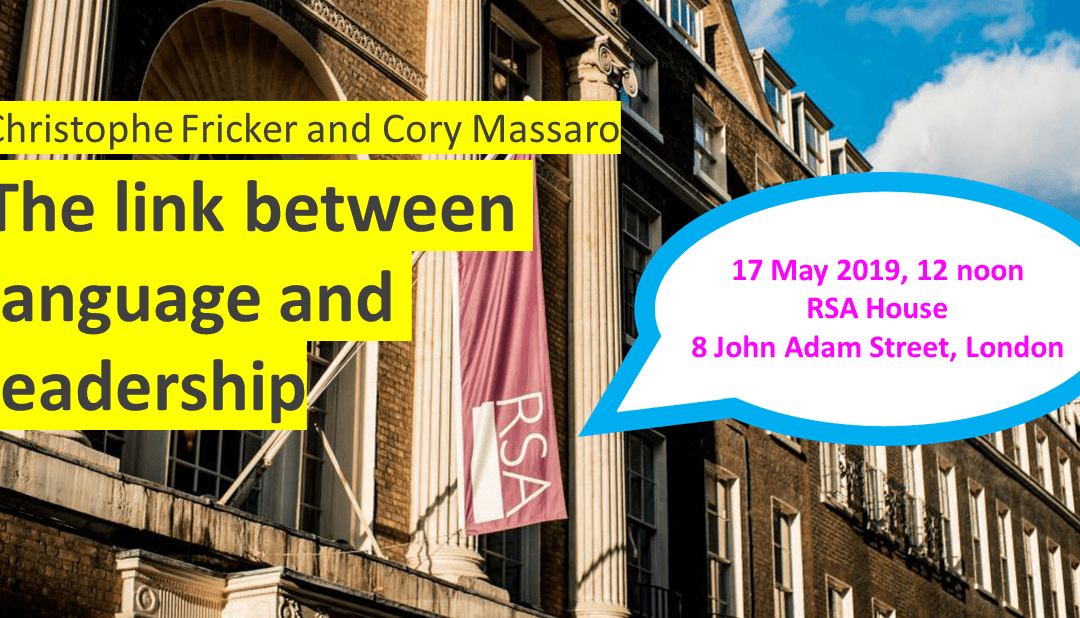
Language, truth and trust, as relates to a recent blog by Seth Godin on different types of truth.
One of the things I love about London is the ease of attending talks and workshops and learning from amazing intellects. Last week was one such occasion where I went to a talk by Dr Christophe Fricker and his colleague Cory Massaro on Language and Leadership.
I then had the lovely opportunity to have lunch with these two gentlemen, a conversation which flowed and ranged widely, very inspiring. I hope to talk more to them and then post something about their talk soon.
For now, a few thoughts that came to me from that, starting with a thought from Cory:
“you know a word by the company it keeps”
The context that Cory Massaro was using for this phrase was in how the meaning of a word can both be inferred and influenced by the words used around it.
The talk used language in the media around Brexit, showing how a media outlet with a particular political stance would use a word (eg “Freedom”) to have one particular meaning with how is surrounded it with other words, whereas another media outlet might mean something almost completely the opposite by a word like “Freedom” which we might all have thought had a quite clear and singular meaning.
As I said, I will go more into this topic once I research more (and talk more to Christophe and Cory).
For today, this segues me, along the lines of the title I gave this post of: “Language, Truth and Trust” to a recent blog by Seth Godin on different types of truth.
I’m simply now going to curate that content by reposting it here, with the note added by me here that his last type of trust, “Cultural Trust”, links very closely to the language concept used above.
In closing, language is so, so, powerful. Simply bringing awareness to the language you use and how it can be received can make so much difference.
Kinds of truth
“Gravity’s not just a good idea, it’s the law.”
Truth is a useful, reliable statement of how the world is. You can ignore it, but it will cost you because the world won’t work the way you hope it will. You can dislike the truth, but pretending it isn’t true isn’t an effective way to accomplish your goals or to further our culture.
Most of the kinds of truth we experience are about the past and the present, and these are the easiest to see and confirm, but there are also truths about cause and effect.
Identity is the truth of description. A circle is round because we define a circle as round. You can say, “a circle is rectangular in shape,” and all you’ve done is confused us. Words only work because we agree on what they mean.
Demagogues often play with the identity of words, as it distracts us.
Axiomatic is the truth about the system. The Peano axioms, for example, define the rules of arithmetic. They are demonstrably true and the system is based on these truths. Einstein derived his theories of special and general relativity with a pad of paper, not with an experiment (though the experiments that followed have demonstrated that his assertions were in fact true.)
There were loud voices in mid-century Germany who said that Einstein’s work couldn’t be true because of his heritage, and many others who misdescribed his work and then decried that version of it, but neither approach changed the ultimate truth of his argument.
Axiomatic truth, like most others, doesn’t care whether you understand it or believe it or not. It’s still true.
Historic truth is an event that actually happened. We know it happened because it left behind evidence, witnesses and other proof.
Experimental truth may not have the clear conceptual underpinnings of axiomatic truth, but it holds up to scrutiny. The world is millions of years old. Every experiment consistently demonstrates this. Experimental truth can also give us a road map for the future. Vaccines do not cause autism. The world is not flat. The amount of carbon dioxide in the atmosphere is rising.
If you want to challenge an experimental truth, the only response is to do a better experiment, make it replicable and show your work.
Personal experience truth is the truth that’s up to you. How you reacted to what happened can only be seen and reported by you.
And finally, consider cultural truth, and this is the truth that can change. This is the truth of, “people like us do things like this.” Which is true, until it’s not. And then people like us do something else.
